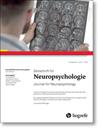Subjective and Objective Cognitive Deficits in Patients with Post-COVID Syndrome
IF 0.5
4区 心理学
Q4 CLINICAL NEUROLOGY
引用次数: 0
Abstract
Abstract: Cognitive impairment is a prominent symptom of the post-COVID syndrome (PCS). However, the correspondence between subjective cognitive complaints (SCC) and objective results is inconsistent. Here, we investigated this discrepancy. This longitudinal study included N = 42 individuals who reported SCC as PCS after mild infection at inclusion. Data collection comprised questionnaires and neuropsychological assessment at baseline and follow-up (FU). At FU – on average 15 months after acute COVID-19 – 88 % of patients reported persisting SCC. There was an approx. 40 % discrepancy between subjective report and test results at both visits. Patients with SCC and objective impairment indicated elevated fatigue and reduced quality of life compared to patients without SCC at FU. A growing number of patients is anticipated to request neuropsychological assessments even after mild infections.新冠肺炎后综合征患者的主观和客观认知缺陷
摘要:认知功能障碍是新冠肺炎后综合征(PCS)的突出症状。然而,主观认知抱怨(SCC)与客观结果之间的对应关系并不一致。在这里,我们调查了这种差异。这项纵向研究纳入了N = 42名在轻度感染后报告SCC为PCS的个体。数据收集包括问卷调查和基线和随访时的神经心理学评估(FU)。在FU -急性COVID-19平均15个月后- 88%的患者报告持续的SCC。有一个近似。在两次访问中,主观报告与测试结果之间有40%的差异。与没有SCC的患者相比,有SCC和客观损害的患者在FU时表现出更高的疲劳和更低的生活质量。预计越来越多的患者即使在轻度感染后也会要求进行神经心理学评估。
本文章由计算机程序翻译,如有差异,请以英文原文为准。
求助全文
约1分钟内获得全文
求助全文
来源期刊

Zeitschrift Fur Neuropsychologie
CLINICAL NEUROLOGY-PSYCHOLOGY
CiteScore
1.00
自引率
25.00%
发文量
17
期刊介绍:
In der Zeitschrift für Neuropsychologie werden aktuelle Forschungsergebnisse sowie Reviewartikel aus dem Bereich der experimentellen und klinischen Neuropsychologie sowie angrenzender Gebiete (z.B. Biologische Psychologie, Neurologie, Neuropsychiatrie, Neuropsychopharmakologie, Rehabilitationspsychologie) publiziert.
Die Beiträge sollen gleichgewichtet sowohl die human- und tierexperimentelle Grundlagenforschung, als auch die klinische Forschung und die klinische Praxis berücksichtigen. Der klinische Schwerpunkt liegt auf der Diagnostik und Rehabilitation von kognitiven und affektiven Störungen, wie z.B. von Aufmerksamkeit, Gedächtnis, Planen und Problemlösen, Sensomotorik, Wahrnehmung, Emotionalität und Sozialverhalten.
 求助内容:
求助内容: 应助结果提醒方式:
应助结果提醒方式:


